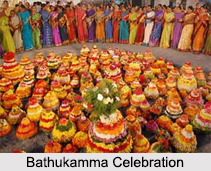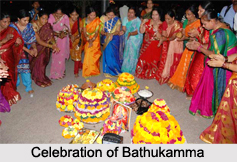Introduction
 Bathukamma is floral festival celebrated by the Hindu women of Telangana. This festival is a symbol of Telangana"s cultural identity. Bathukamma festival is also known as "Bodemma". This festival is celebrated in the months of September - October. It is celebrated for nine days during Navaratri. This festival starts on the day of Mahalaya Amavasya. It ends two days before Dussehra known as Durgashtami. On the final day Bathukamma panduga is celebrated as a great festival - Pedda Bathukamma or Saddula Bathukamma.
Bathukamma is floral festival celebrated by the Hindu women of Telangana. This festival is a symbol of Telangana"s cultural identity. Bathukamma festival is also known as "Bodemma". This festival is celebrated in the months of September - October. It is celebrated for nine days during Navaratri. This festival starts on the day of Mahalaya Amavasya. It ends two days before Dussehra known as Durgashtami. On the final day Bathukamma panduga is celebrated as a great festival - Pedda Bathukamma or Saddula Bathukamma.
Bathukamma comes throughout the last half of monsoon, before the beginning of winter. The monsoon rains generally brings a load of water into the new water ponds of Telangana and it is also the time when wild flowers blossom in different lively colours all across the unfarmed and infertile plains of the region. The most plentiful of these are the "gunuka poolu" and "tangedu poolu". There are other flowers too like the banti, chemanti, nandi-vardhanam etc. Bathukamma is celebrated by the women folk of Telangana, heralding the beauty of nature in vivacious colours of multitudinous flowers.
Etymology of Bathukamma
Bathukamma in Telugu means "come alive Mother Goddess" and the festival represents the cultural spirit of Telangana, symbolizing the patron Goddess of womanhood.
History of Bathukamma Festival
According to the Hindu spiritual scholars and pundits, once upon a time there was a King named Dharmangada who belonged to the Chola Dynasty. This particular king principally ruled over South India. They lost their hundred sons in the war front. So they prayed and performed ceremony to Goddesses Lakshmi to be born as their daughter. His wife gave birth to a girl child after many years of rituals and appeal. She was named as Princess Lakshmi. For the period of Baby Lakshmi brought up she survived several unexpected accidents and incidents in life. The parents felt life and death while bring up their only child. Afterwards they named their daughter as Bathukamma. According to the Telugu language, Bathuku means ‘life’ and Amma means a ‘female names and mother’.
Then on this particular Bathukamma celebration is magnificently celebrated by young girls in Telangana region of Telangana in India. The major purpose of this particular festival is to request with dedication to the Goddess in the strong faith that all young girls would get their beloved husbands as per their desire and wish soon.
Bathukamma celebration has lots of myths following its celebration. According to the Hindu religious scholars and pundits, one myth regarding Goddess Gauri is that she after a ferocious fight killed ‘Mahishasura’ the devil. After this serious act, she went into deep sleep due to exhaustion on the ‘Aswayuja Padyami’ day. All the Hindu spiritual devotees powerfully prayed with devotion and dedication for her to wake up. It is to be noted that she woke up on the Dashami day.
Rituals of Bathukamma
The celebration begins a week previous to the majestic ‘Saddula Batukamma’ (the grand finale of the Batukamma festival) which falls two days before Dussehra. Women gather in the evening with their bathukammas and place them in the middle. The women dance around them. They sing folk songs. After singing and dancing Bathukammas are taken to a lake and are set a float in the water. For the nine days, in the evening, women, particularly young girls, meet in large numbers with their Bathukammas in open areas of their area. All women will form a circle around the Bathukamma and start singing folk songs by appreciation their hands and revolving around the Bathukamma. On the last day, the men folk of the house go into the natural plains and meet the flowers like gunuka and tangedi. They bring home bagfuls of these flowers and the whole household sits down to make the big ‘Batukamma’. After playing in circles about the Batukammalu, before the beginning of twilight, the women folk carry them on their heads and move as a march towards a bigger water body near the village or town. Ultimately, when they attain the water pond the Batukammalu are slowly immersed into water after some more playing and singing.
Celebration of Bathukamma
Bathukamma festival begins on the day of Mahalaya Amavasya and the festival continues till 9 days, ending on the day of Durgashtami. During the first 5 days, women clean their courtyard. The cow dung is then mixed with water and spread throughout as the ground-base. Then it is further decorated with a Rangoli which is made of rice flour. The preparations and decorating the Rangoli and other things is folk art and generally, the preparations begin from afternoon. The men collect the flowers of vibrant colours and types for the preparations. There flowers are mainly; Celosia, Senna, Marigold, Lotus, Cucurbita, Cucumis etc. On this final day of Bathukamma, immersion of Bathukamma in water bodies is celebrated with utmost devotion and enthusiasm through out Telangana region.
Women participate in the festival with great fervour dressing up in their best, wearing traditional Silk Sarees and jewellery while young girls wear "Langa-Oni" the traditional attire of young girls of the region. The women gather in large numbers along with their Bathukammas in their locality, place them in the middle and dance around them while singing soul stirring Bathukamma folk songs.
The songs are more of the stories of common woman, her dreams, her responsibilities, plights sung spontaneously most of the time. Some times the songs describe just the beauty of the nature and some times reflect the socio-economic and political conditions of the region. After singing and dancing, Bathukammas are set afloat in lake or river. On the occasion, the women exchange Turmeric and Kumkum which married women consider most auspicious. "Maleeda", a prasadam made of jaggery, is prepared and distributed among the women.
Legend of Bathukamma
 There is a legend about Bathukamma festival mentioned in Telugu books. Daksha performed a Yajna and invited everyone but except his youngest daughter, Gauri, who married to Lord Shiva against his wish. Against Shiva"s will, Gauri went to the Yajna and was insulted along with Lord Shiva. She was unable to tolerate the insult and sacrificed her life by setting herself ablaze. Wishing to bring her back, women present her flowers and make turmeric idol of the Goddess and sing and dance around the idol of Bathukamma.
There is a legend about Bathukamma festival mentioned in Telugu books. Daksha performed a Yajna and invited everyone but except his youngest daughter, Gauri, who married to Lord Shiva against his wish. Against Shiva"s will, Gauri went to the Yajna and was insulted along with Lord Shiva. She was unable to tolerate the insult and sacrificed her life by setting herself ablaze. Wishing to bring her back, women present her flowers and make turmeric idol of the Goddess and sing and dance around the idol of Bathukamma.
Another legend of Bathukamma Festival is also mentioned in one of the historical texts scripted in Telugu. Centuries ago, King Dharmangada of Chola Dynasty used to rule South India. He was childless for many years after marriage. After performing many pujas and rituals, his wife gave birth to Goddess Lakshmi. Baby Lakshmi survived many accidents. So, her parents named her Bathukamma. Since then, Bathukamma festival is celebrated by women in Telangana region.



















